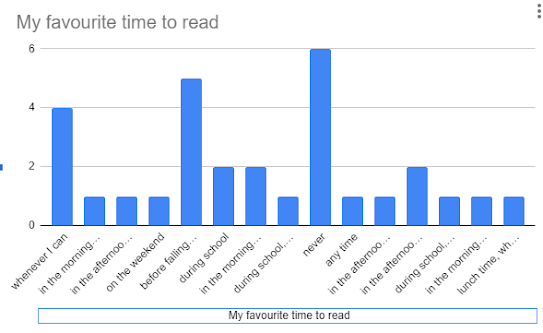Reader Profile Survey - RPI
The Reader Profile Survey has given me insight into the students in my class as readers.
The areas of the data I found most interesting will be what I will focus on sharing and help me organise a class library to suit my students' book/ reading choices and make recommendations for new books in our school library.
1. Do my students like reading at school?
2. Do my students prefer reading in their own time for enjoyment?
3. Are my students currently reading a book for enjoyment?
4. What types of books do my students like to read in their own time?
5. What are my students' favourite times to read?
6. What are some of the most recent books my students have read?
I also chose the following two questions to inform me of what my students see as being important to be a good reader.
9. What skills do my students think they need to be good readers.
10. What my students want to get better at in reading.
Watch this space.
I had a glitch with collecting my data when I used and shared the wrong form with my students. I saw my students working on and completing the form but could not see the data.
Thank goodness the issue was solved [Thanks Naomi] and I am now working on putting the data from the 10 questions I have chosen into graphs. Look out for my data slide presentation.
Thank goodness for Manaiakalani Toolkits. I managed to get graphs to show responses to the questions I chose to use from the survey to find out the book types the students in my class like to read and how this can help us to set up a class library to better suit what my students like and want to read.
I like reading at school.
I like reading books in my own time for enjoyment.
I am currently reading a book for enjoyment.
Types of books I like to read in my own time.
My students' favourite time to read.
Students favourite books to read.
Two questions that helped me to get to know my students as readers are -
What skills do my students think they need to be good readers.
Although the students listed several skills that could help them with reading, it was interesting to see from the students list, reading more stood out among all the other skills mentioned.
The second question is - What do my students want to get better at in reading.
What interested me with this graph is that most students wanted to get better at being focused when reading. I wonder why being focused is a priority for the students when it comes to reading?
This would be a good question to ask in group reading discussions.





















